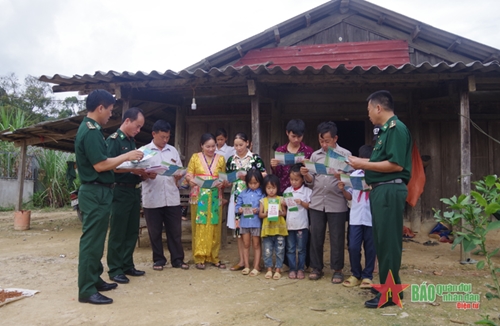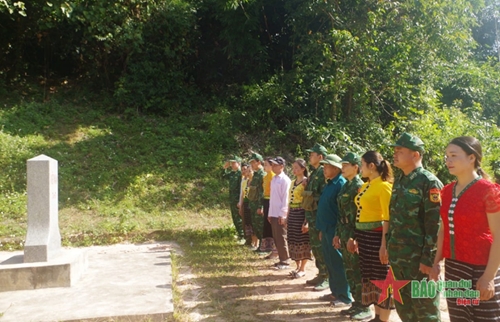Sound guideline, effective models
In Nghe An’s land border area adjacent to the provinces of Xiangkhouang, Borikhamxay and Huaphanh of Laos, most of the population are ethnic minority people with close relationship. Thanks to the great policies of the Party, State, local authorities, and the joint efforts of functional forces, the border localities have seen positive developments.
However, due to harsh natural conditions, poor infrastructure, and uneven educational levels, the living standards of ethnic minority people in the areas are still low compared to other localities in the province. In addition, the complicated situation of crime and illegal border exit and entry has posed many challenges for the provincial border guard force in implementing the task of protecting national sovereignty and security in border areas and ensuring public order.
    |
 |
|
Troops of the Border Post of Nam Can International Border Gate disseminating law to local people |
Learning about the situation, the Nghe An provincial Border Guard’s Party Committee and Chain-of-Command has issued guidelines and measures to successfully fulfill all assigned missions, especially mass mobilization work in border areas. In particular, the Central province’s border guard force has made recommendations to and work with local party committees and authorities at all levels to actualize big guidelines, such as appointing border guard officers to hold positions as secretaries and deputy secretaries of the party committees of border communes, nominating border guard officers to run for election to the district and commune people's councils; sending party members of border posts to be part of party cells of border villages.
In their different positions, troops of the Nghe An provincial Border Guard Command have closely followed the developments of local situation and supported local authorities and people to stabilize their life.
Along with policies, border posts have closely followed local situation and effectively built livelihood support models in combination with mass mobilization work. The "Charity House Complex" model of My Ly Border Post is the clearest proof.
After three-year operation, the "Charity House Complex" has become a place to provide daily necessities at a price of 0 VND for families in difficult circumstances in the area. There are also a free library, barber shop, and computer room for students, officials, and people in the area.
According to Lieutenant Colonel Hoang The Tai, Political Commissar of My Ly Border Post, "The charity house complex" has attracted a large number of people from all walks of life. This model has created favorable conditions for troops to disseminate the Party’s guidelines and State’s laws to local people.
Meanwhile, Tam Quang Border Post has set up the "Construction team in military uniforms." Apart from regular tasks, the unit’s troops have been ready to undertake missions of providing assistance for local people. After four years, the model has completed ten projects, including houses for needy people, classrooms for local schools, and rural roads.
Other effective models include “Medical cabinets in border areas” launched by Phuc Son Border Post to provide healthcare for locals and “Military-civilian livelihood” of Nhon Mai Border Post to give breeding animals to residents.
Troops’ enthusiasm and wholeheartedness
Thanks to preferential policies of the Party and State, and the contribution of local authorities and functional forces, including the Nghe An provincial Border Guard Command, many border villages have seen clear positive changes. Many years ago, the life of the H’mong ethnic minority people in the border village of Huoi Son, Tam Hop commune, Tuong Duong district, Nghe An province faced many difficulties, along with complicated security situation.
The Border Guard Command of Nghe An province mobilized funds and hundreds of officers and soldiers to support 37 households in the village to reinforce their houses, pave roads, and reclaim land for wet rice cultivation.
    |
 |
|
Troops of Thong Thu Border Post and local people in a patrol to protect the borderline and border markers |
The enthusiasm and wholeheartedness of the province’s border guard troops won the heart and trust of the H’mong ethnic minority people in Huoi Son, who gradually understood and started farming and raising livestock to eliminate hunger and reduce poverty. Thanks to that, 75 households with 400 people in the village now are enjoying a stable life with more children going to school, and over 90% of families having motorbikes and televisions. The party cell of Huoi Son village has 16 members who always stay united and enthusiastically mobilize locals to develop the economy and ensure national defense and security.
The life of the Dan Lai people in Co Phat and Bung villages, Mon Son commune, Con Cuong district has positively improved thanks to the contribution of generations of border guard officers and soldiers of Nghe An province. Twenty years ago, border guard troops came to the villages and mobilized people to reclaim land and grow wet rice. They then brought many types of seedlings and animals to the localities, equipped locals with farming and animal husbandry techniques, mobilized them to eliminate backward customs. Thanks to the efforts, the life of the Dan Lai people has significantly improved, helping them integrate well with the ethnic communities in the region.
The achievements in economic development have enhanced ethnic minority people’ love and trust in the border guard force. They have actively supported border guard force to protect border areas and ensure security and order. The provincial Border Guard Command has worked with local authorities to build 89 teams to mobilize 585 households and 628 individuals to self-manage the borderline, border markers, and ensure local security.
Deputy Head of the Nghe An provincial Party Committee’s Mass Mobilization Commission Phan Thanh Hoai recalled that over the past time, the provincial Border Guard Command’s Party Committee and Chain-of-Command have actively educated troops to raise their awareness of the role and importance of mass mobilization. Thanks to that, troops have promoted their responsibility and come up with creative and effective methods to encourage local people to strictly observe the Party’s guidelines and State’s policies. Through practical activities, the solidarity between troops and people has been consolidated, creating a strength to protect national sovereignty and security in border areas.
Translated by Tran Hoai